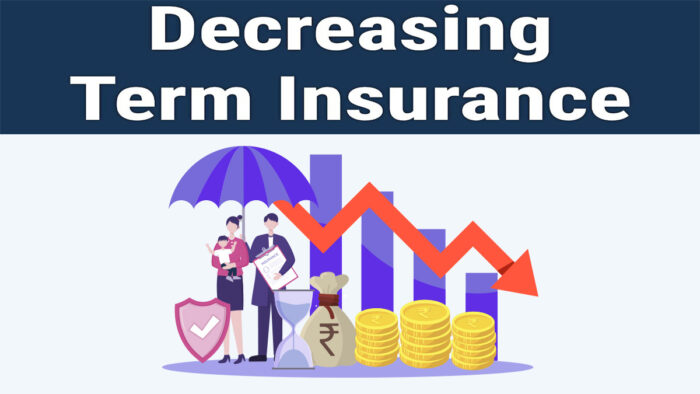In the manifold world of life insurance, where its purpose is to provide financial security and serenity to policyholders as well as their beneficiaries, decreasing-term insurance appears to be a category-specific and special product designed for certain financial obligations.

This type of insurance differs in its purpose and structure and is tailor-made to meet the wants of people who need economical and money-saving solutions against the budget implications of specific responsibilities and debts plummeting as time goes on.
What is Decreasing Term Insurance?
Decreasing term insurance, also called DTA insurance, is a type of term life insurance where the death benefit decreases at a fixed rate over the life of the policy, usually in the form of a loan or a financial obligation. Apart from this, this decrease continues until the policy expires, which typically coincides with the end of the financial obligation it is meant to cover.
In addition, it is designed to offer a safety net for individuals who want to ensure that specific debts, such as a mortgage, car loan, or any other significant financial responsibilities, are taken care of in the event of their untimely death.
How Does It Work?
The system of DTA insurance is straightforward yet strategic. At the inception or end of the policy, the policyholder chooses a coverage amount and term length that correspond with their debt or financial obligation timeline. Over the policy term, the death benefit decreases at a fixed rate, which is detailed in the policy agreement.
For instance, if you have a 30-year mortgage, you could align your decreasing-term insurance policy to match this period. As you gradually pay off your mortgage, the potential payout of the policy decreases accordingly. If the policyholder dies while the policy is active, the insurance company pays out the current death benefit, typically used to cover the remaining debt.
What Does Decreasing Term Insurance Cover?
Although the coverage options offered by a decreasing term insurance policy vary among insurance companies, this insurance policy is designed to cover debts that decrease over time. The most common use is to cover mortgage repayments, but it can also be used for:
- Personal loans
- Car loans
- Business loans
- Educational loans
As well as any other type of debt that diminishes over time. The basic purpose is to relieve your dependents of the financial burden of paying off the loan in case of your death. Therefore, they must make sure they can have ownership of the home or asset without financial strain or stress.
What Does It Not Cover?
While decreasing term insurance is beneficial for decreasing debts, it has limitations. Firstly, it does not offer a fixed benefit amount throughout the policy term, which means it may not be suitable for those looking to leave a lump sum to their beneficiaries irrespective of their financial obligations.
Additionally, it does not build cash value like some other types of life insurance, such as whole life or universal life policies. Once the policy term ends or the debt is paid off, the coverage ceases without any return on the premiums paid.
How Much Does Decreasing Term Insurance Cost?
The cost of purchasing a decreasing term insurance quote differs based on various factors. Some of them include the initial amount of coverage, the policyholder’s age, health, and the term length.
Although the death benefit decreases over time, it is still more affordable than level term insurance, where the death benefit remains constant. This is why it is important to compare quotes from different insurance companies and consider how the decreasing benefit relates to your coverage needs and your financial obligations.
How to Get Decreasing Term Insurance
If you have decided on getting or obtaining decreasing term insurance, this is the guide you need. With the steps in this section, you will be able to purchase the best one for your needs:
• Assess your needs
Determine the size of the debt or financial obligation you want the policy to cover and how long you need the coverage to last.
• Shop around
Compare quotes and policy terms from multiple insurance providers to find the best rate and coverage that fits your needs.
• Begin application
Once you’ve selected a provider, complete an application, which will include questions about your health, lifestyle, and financial situation.
• Undergo a medical exam
Some insurance companies or providers require interested policyholders to have a medical exam to determine their health status and risk level.
• Policy review and approval
After reviewing your application and possibly conducting a medical exam, the insurer will offer you a policy with specific terms and premiums. Review these carefully.
• Make Payment
Once you agree to the policy terms and make the first premium payment, you can start receiving coverage.
FAQs
Who typically buys decreasing term insurance?
Individuals who have financial obligations that decrease over time, such as a mortgage or other loans, often opt for this insurance policy. It ensures that if they were to pass away before fully paying off the debt, their beneficiaries would have enough to cover the remaining amount.
Can i use decreasing term insurance for other purposes besides covering a mortgage?
While people commonly use it for mortgage protection, decreasing term insurance can also cover other types of loans or financial obligations that decrease over time, such as personal loans or business loans.
Can I convert decreasing term insurance into a permanent policy?
Some insurance companies offer conversion options that allow you to convert a DTA insurance policy into a permanent life insurance policy, such as whole life or universal life insurance. However, conversion options vary by policy and insurer, so it’s essential to check the terms of your policy.
How do I determine the appropriate coverage amount for DTA insurance?
The coverage amount for DTA insurance should be enough to cover the remaining balance of the debt you’re protecting, such as your mortgage. It’s essential to consider factors like interest rates, loan terms, and any additional expenses your beneficiaries might face.
Is decreasing term insurance taxable?
Generally, the death benefit from a life insurance policy, including decreasing term insurance, is not taxable to the beneficiaries. However, if the policy has accumulated cash value and you surrender or cash out the policy, there may be tax implications. It’s best to consult with a tax advisor for personalized advice.
Can I cancel my decreasing term insurance policy?
Yes, you can typically cancel your decreasing term insurance policy at any time. However, if you cancel, you may lose any premiums you’ve paid, and your beneficiaries will no longer receive the death benefit. Be sure to review the terms of your policy and consider any alternatives before canceling.



